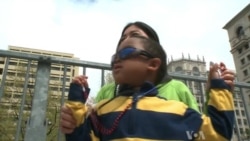American cities are assessing security following Monday's bombing at the Boston Marathon. Washington DC went ahead with an annual parade as authorities across the country took security measures and people responded to them.
Washington's Emancipation Day parade, which commemorates the emancipation of more than 3000 slaves in 1862, went on as planned after city officials said there would be an increased police presence.
The heightened security wasn't evident to Elizabeth Rau, who came to see the parade. But she said she's sure it's there.
"I think it'd be more likely to get in a car accident than anything happening here," said Rau.
Peter Boyce said the attack in Boston reinforced his plan to attend the festivities.
"This is a land of freedom, and we will not be deterred by any cowardly acts on this country, whether it be in Boston or anyplace else, and that is why it was important that we come out here today," said Boyce.
It was personal for Boyce. He attended the parade with his wife and two young sons, but has another child who lives in the Boston area.
"We have a son who was on lockdown at Harvard yesterday," he said. "And I told him that definitely that we would make sure that we would come out in full force today to come to this Emancipation Day parade."
Deltha Jeffries brought her granddaughter. She said security concerns did cross her mind.
"I thought about there being a large crowd and this being another opportunity for terrorists to infiltrate," said Jeffries. "But, you know, if you're going to worry about that all the time, you're never going to have fun in the rest of your life."
President Obama said the FBI is investigating the Boston attack as an act of terrorism.
"In the coming days, we will pursue every effort to get to the bottom of what happened, and we will continue to remain vigilant. I've directed my administration to take appropriate security measures to protect the American people," said President Obama.
Those measures extend to the president's residence. A section of Pennsylvania Avenue in front of the White House, often filled with tourists, is now closed to pedestrians.
In New York City, patrols near hotels were increased after the bombing, said Police Commissioner Raymond Kelly.
"We also patrolled houses of worship - we'll continue to do that - and significant infrastructure locations in the city, iconic potential targets: Rockefeller Center, Empire State Building, locations such as that," said Kelly.
The security presence was visible in New York City's train stations, its airports and in Times Square, which was targeted in a failed attack three years ago.
Across the country, from downtown Chicago to the baseball stadium of the Los Angeles Dodgers, the increased security presence was visible.
There was also another inescapable sight: the nation's flag at half-staff in honor of Boston's dead.
Washington's Emancipation Day parade, which commemorates the emancipation of more than 3000 slaves in 1862, went on as planned after city officials said there would be an increased police presence.
The heightened security wasn't evident to Elizabeth Rau, who came to see the parade. But she said she's sure it's there.
"I think it'd be more likely to get in a car accident than anything happening here," said Rau.
Peter Boyce said the attack in Boston reinforced his plan to attend the festivities.
"This is a land of freedom, and we will not be deterred by any cowardly acts on this country, whether it be in Boston or anyplace else, and that is why it was important that we come out here today," said Boyce.
It was personal for Boyce. He attended the parade with his wife and two young sons, but has another child who lives in the Boston area.
"We have a son who was on lockdown at Harvard yesterday," he said. "And I told him that definitely that we would make sure that we would come out in full force today to come to this Emancipation Day parade."
Deltha Jeffries brought her granddaughter. She said security concerns did cross her mind.
"I thought about there being a large crowd and this being another opportunity for terrorists to infiltrate," said Jeffries. "But, you know, if you're going to worry about that all the time, you're never going to have fun in the rest of your life."
President Obama said the FBI is investigating the Boston attack as an act of terrorism.
"In the coming days, we will pursue every effort to get to the bottom of what happened, and we will continue to remain vigilant. I've directed my administration to take appropriate security measures to protect the American people," said President Obama.
Those measures extend to the president's residence. A section of Pennsylvania Avenue in front of the White House, often filled with tourists, is now closed to pedestrians.
In New York City, patrols near hotels were increased after the bombing, said Police Commissioner Raymond Kelly.
"We also patrolled houses of worship - we'll continue to do that - and significant infrastructure locations in the city, iconic potential targets: Rockefeller Center, Empire State Building, locations such as that," said Kelly.
The security presence was visible in New York City's train stations, its airports and in Times Square, which was targeted in a failed attack three years ago.
Across the country, from downtown Chicago to the baseball stadium of the Los Angeles Dodgers, the increased security presence was visible.
There was also another inescapable sight: the nation's flag at half-staff in honor of Boston's dead.





